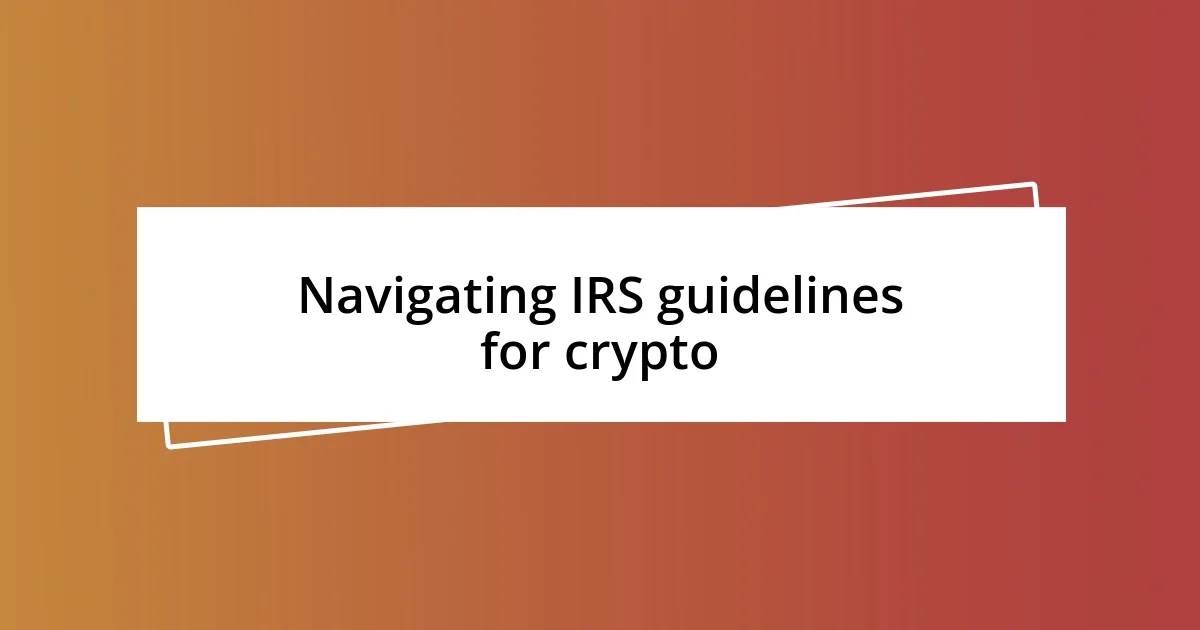Key takeaways:
- Meticulous record-keeping of all crypto transactions is essential to manage tax obligations effectively and avoid potential issues during tax filing.
- Different types of crypto transactions trigger varying tax consequences, such as capital gains tax on sales and trading, while certain activities like holding crypto are non-taxable events.
- Understanding IRS guidelines, including distinctions between short-term and long-term capital gains and the implications of staking, airdrops, and losses, is crucial for accurate reporting and tax planning.

Understanding crypto tax obligations
Navigating crypto tax obligations can be a real maze, and I remember the first time I faced these regulations. I felt a mix of confusion and anxiety, questioning how my investments, particularly in Bitcoin and Ethereum, would impact my finances. Did you know that every trade, no matter how small, can potentially trigger a taxable event? It’s surprising, isn’t it?
When I sold some of my altcoins last year, I learned a hard lesson about capital gains tax. For a moment, I was celebrating my profits, only to realize later that the IRS wanted a cut. Understanding whether you’re dealing with short-term or long-term gains is crucial because it directly affects your tax rate. It’s a complex dance between gains and losses that can lead to unforeseen tax liabilities if you’re not careful.
One key takeaway from my experience is to keep meticulous records of all your transactions. Have you ever found yourself scrambling to recall every buy or sell? I have. Tracking every wallet transfer, trade, and exchange activity can make a huge difference when tax season rolls around. Trust me, clear documentation not only eases the burden during tax filing but also helps you understand your overall investment strategy better.

Tax treatment of crypto transactions
It’s essential to recognize that different types of crypto transactions have varying tax consequences. When I initially purchased crypto, I didn’t realize that simply holding my assets wasn’t a taxable event. However, as soon as I sold or exchanged them, I learned that any appreciation in value became subject to capital gains tax. This revelation forced me to reassess my strategy and become more proactive in understanding how my transactions could impact my taxes.
Moreover, every transaction can be categorized differently, affecting how you report them. For instance, swapping one cryptocurrency for another is treated as a sale and could trigger capital gains tax. I remember vividly how I accidentally mistook a simple trade as a non-taxable event, only to be met with the unpleasant surprise of a tax bill later. It’s a stark reminder that staying informed is crucial in this rapidly evolving landscape.
Lastly, the distinction between personal versus business usage of crypto cannot be overlooked. If you’re using cryptocurrency in your business operations, the implications can be even more intricate. I found out the hard way when my occasional freelance payments in crypto turned out to have their own tax treatment. Clarifying my intentions with each transaction drastically altered how I approached record-keeping and tax planning.
| Transaction Type | Tax Treatment |
|---|---|
| Buying Crypto | No tax implications |
| Selling Crypto | Subject to capital gains tax |
| Trading Crypto (e.g., Ethereum for Bitcoin) | Considered a sale; capital gains tax applies |
| Using Crypto for Goods/Services | Taxable event; treated as a sale |
| Mining Cryptocurrency | Income tax applies to fair market value on the day mined |

Reporting crypto income accurately
Accurate reporting of crypto income isn’t just about numbers; it’s about the experiences that shape our understanding of tax obligations. I vividly remember the sinking feeling that hit me when I discovered I hadn’t reported the staking rewards I earned from my altcoins. It was like finding out I had been driving without a seatbelt — nerve-wracking and potentially costly. Those rewards, which I initially considered a bonus, are indeed taxable income, and the failure to report them could lead to penalties that I certainly wanted to avoid.
Here’s a quick list of critical points I’ve gleaned about accurately reporting crypto income:
-
Staking Rewards: Any rewards earned from staking need to be reported as income based on their fair market value at the time received.
-
Airdrops: If you receive tokens from an airdrop, these are taxable and must be reported.
-
Hard Forks: New coins received from a hard fork are also considered taxable income.
-
Cryptocurrency as Payment: If you accept cryptocurrency for goods or services, the fair market value at the time of receipt should be reported as income.
-
Losses vs. Gains: It’s just as important to report losses because they can offset gains, reducing your overall tax burden.
Staying organized has been my saving grace. Sure, it takes a bit of time to categorize every transaction, but it’s worth it to sidestep the headaches of a potential audit.

Deductions and exemptions for crypto
When it comes to deductions and exemptions in the world of cryptocurrency, I discovered some intriguing possibilities that surprisingly eased my tax burden. For example, I often incurred losses when trading, which I learned could be used to offset gains. This meant that if I had a rough patch with certain investments, I could balance things out by reporting those losses, ultimately reducing my overall capital gains tax. It’s like finding a silver lining in what initially felt like a storm cloud of financial uncertainty.
One concept that I found particularly nuanced was the ability to deduct transaction fees associated with crypto trades. After realizing that these fees added up significantly over time, I began tracking them meticulously. It struck me that these costs, often overlooked, directly impact the net gain from my trades. By documenting those expenses accurately, I could ease the financial blow of taxes, which felt like a small victory to me each tax season.
Interestingly, I found that donations made in cryptocurrency to eligible charitable organizations could lead to deductions as well. I made a generous donation in crypto to a charity close to my heart, and the tax implications turned out to be quite favorable. Not only did it feel great to contribute, but I also took advantage of the deduction based on the fair market value of the crypto at the time of the donation. It made me think: isn’t it wonderful when doing good can also help us benefit financially?

Keeping records for crypto taxes
Keeping detailed records for crypto taxes is something I never took lightly. I remember the first time I compiled my transaction history—it felt overwhelming. But once I started organizing my trades, it became a huge relief. Each buy, sell, and transfer mattered, and documenting them accurately helped clarify my tax obligations.
As I maintained my records, I realized how crucial it was to track the date and value of each transaction. An incident sticks out in my mind: I had a minor mishap where I mixed up dates for some trades, which made my gains seem higher than they were. That error was a stark reminder for me—what a headache reconciling everything turned out to be! Wouldn’t it be easier to prevent such confusion from the start?
I also found that using dedicated software or spreadsheets to log trades was a game-changer for me. I would often look back fondly at the time I saved compared to rummaging through emails and exchange statements. During tax season, having all that data easily accessible felt like having a well-organized toolkit—no more last-minute panic. And honestly, knowing I had everything in order gave me peace of mind, which is invaluable during such a chaotic time.

Navigating IRS guidelines for crypto
Navigating IRS guidelines for cryptocurrency can feel like deciphering a complex maze. I still remember the first time I stumbled upon the IRS’s crypto-related questions on my tax return. Was I ready to tackle this? It was daunting at first; I was afraid I might misinterpret something crucial. However, I learned that clarity often comes from splitting the overwhelming information into manageable bites. Each guideline, especially those around reporting gains and losses, is essential to prevent future headaches.
One of the most surprising revelations for me was the distinction between short-term and long-term capital gains. I recalled a year when I held onto some coins for just a few months before selling. The difference in how much tax I owed once I figured out the holding periods genuinely changed my perspective. Did I favor short-term gains for immediate cash flow? Absolutely! But understanding their tax implications was eye-opening. It made me reconsider my trading strategies by blending my immediate needs with a more tax-efficient approach.
As I dug deeper, I encountered the concept of like-kind exchanges, which the IRS addressed in 2014. For awhile, the thought of swapping one crypto for another without tax consequences intrigued me. But then, I realized those guidelines had shifted, and it wasn’t as simple as I had hoped. I remember feeling a hint of frustration mixed with relief—frustrated that I couldn’t use that strategy anymore, yet relieved to have clarity. Keeping up with the evolving landscape of IRS rules is crucial, and I often ask myself: how can I ensure I’m ahead of the curve? The answer lies in continuous learning and adapting, which I find both challenging and rewarding.














